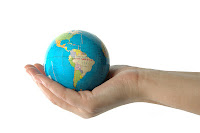What They Are and Why They're Useful
Yesterday I started a new theme for my blog, Mug Book Monday. "Mug books" are are collections of biographical sketches usually found within or alongside county histories of the late nineteenth- and early twentieth-centuries, particularly in the United States. As our nation celebrated its centennial in 1876, genealogy and local history became of interest to the layman, and this spurred the publication of county histories and biographies. Often, a family or individual had to pay to have their biography written up and published. If a person were lacking in finances or interest in having their life story published, then there possibly won't be a biography for him, even if he were a prominent citizen. Also, keep in mind that because someone might have paid to have the biography written, it would tend to highlight only the positive aspects of this person's life or ancestry. It's also possible that there could be erroneous information given, perhaps even deliberately. Beware of sweeping generalizations, such as "the subject's mother-in-law was of Scottish heritage" or "his grandfather fought with Washington in the American Revolution." Nevertheless, county histories and biographies are great secondary sources for genealogists because they often list parents, siblings, children, spouses, and in-laws; track migration; depict photographs of the individual and/or their home or business; and give birth, marriage, death, and burial dates and locations. This is especially important as vital records were not usually kept until the late nineteenth or early twentieth centuries in many states. Additional information often includes occupations, religious and political affiliations, and societies in which the individual was a member. Remember to check to see if your ancestors' siblings, cousins, or in-laws were featured in mug books, as an indirect way to glean genealogical gems.
By entering the county name and a phrase such as "spokane county history" or "muskegon county biographical", Google can come up with a linked title either available in electronic format on the Internet or listed in a online bookstore, such as Amazon. Note that if your county name is very common, you may wish to list the state name in your search as well: "lincoln county washington" "county history".
Where to Find Mug Books Online
- Subscription sites - here are some well-known genealogy subscription websites containing many county histories and biographies; you may already have subscriptions to these or can access them for free via your public library or FamilySearch Center: American Ancestors (NEHGS), Ancestry, GenealogyBank, WorldVitalRecords
- Digitized free book sites - FamilySearch Family History Books, Google Books, Hathi Digital Trust Library, HeritageQuest Online (requires a library card from a participating library; many FamilySearch Centers also have free access), Internet Archive, Project Gutenberg
- Archives, Libraries, Societies, Genealogical County Sites - to find digitized mug books, check out state, county, local and university archives (many are linked at my blog in my Online American Digital Archives and Databases series, or the Repositories of Primary Sources site); public library sites; and genealogical and historical society sites. Many transcribed mug books can be found at genealogical county sites such as USGenWeb, USGenNet, or GenealogyTrails. Use all these sites by going to the local level of your county of interest to find what might be available. For instance, use the PublicLibraries site to find a library in your county of interest to see if there is a digitized local history book on that library's website.
- Portals - sites that link you to other sites where the digitized or transcribed books reside: Cyndi's List, DigitalBookIndex, LearnWebSkills' County and Town Histories, Linkpendium, Online Books Library Page. Depending on the site, you can either run a search on a title, or work your way down to the county page to find the book of interest.
- Google Search - Go to Google or your favorite search engine and enter the name of the title you want, in quotes: "History of the counties of McKean, Elk, and Forest, Pennsylvania, with Biographical selections"
Where to Find Mug Books Offline
Yet another offline option is to use your local FamilySearch Center. Volunteers at these local branches of the Family History Library (FHL) can help you order mug books on microfilm or microfiche from Salt Lake City to be viewed on machines at your local FamilySearch Center. Once you know how to do this, you can also order these directly on the FamilySearch website. There is a small rental fee involved. Books are not generally loaned to a FamilySearch Center from the FHL. However, you can request that a researcher at the FHL do a look up for one of your ancestral names in a mug book. If found, photocopies can be made and mailed to you, again for a small fee. Check with the volunteers at the FamilySearch Center for assistance with this.
Mug Books in Other Countries
Join Me









9 comments:
You'll find similar books in Canada. In particular, there were lots of these kinds of publications created in the provinces of Alberta and Saskatchewan in 1980, the year that both celebrated the 75th anniversary of their creation as provinces. There was funding provided to many prairie towns to create history books of the communities, which included a large section on the families living in the area. While a lot of the caveats you mention apply to these books because a lot of the information was submitted by the people who were included in the books, you didn't have to pay to be in them. You only paid if you wanted to buy a copy. While some people may have been left out, many of the volunteer organizations who made these books usually took steps to ensure some mention was made of notable or prominent individuals or families.
Thank you, Sean!
I've found a number of these book using Google books. They have county histories, biographies and a whole lot more.
Regards, Jim
Google Books Genealogy at Hidden Genealogy Nuggets
Hi, Jim,
Yes, I have Google Books listed under Digitized Book Sites (#2 of Where to Find Mug Books Online). I, too, have found several ancestors mentioned in Google Books. It is one of my favorite "genealogy" sites. In fact, Google Books featured me in a video a few years ago, as part of a series of hobbyists using Google Books in unique ways.
Thanks for dropping by!
P.S. I also have many links to directories at Google Books on my Online Historical Directories website!
Just wanted you to know I'm adding this to my Follow Friday post.
Thanks, Kathy!
I like the term "mug books". Finding my great grandfather's biographical sketch through a random Google books search was one of my most exciting early finds. I knew nothing about my father's family, since my parents divorced when I was seven and this was thrilling. Since then, I have discovered several related ancestors and have cross checked information in them.
Very cool, Margel!
Post a Comment